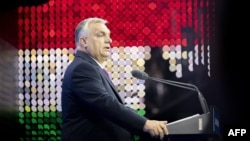Extending sanctions against Russia has been one of the most pressing issues for the European Union -- especially this year. And Hungary's record of holding out against such sanctions has officials in Brussels worried about what will happen when the next extension deadline comes around, this time in July.
Hungarian Prime Minister Viktor Orban has for a long time voiced opposition to the EU's sanctions on the Kremlin and refused to agree on any new measures that target energy imports into the bloc from Russia.
These rollovers happen every six months and are split into two groups: sectoral sanctions -- such as import bans on various Russian goods -- and listings, meaning visa bans and asset freezes on more than 2,500 Russian individuals and firms.
The sectoral sanctions come up for renewal in January and July, while the listings are reviewed for prolongation in March and September. That adds up to four decisions each calendar year, all of which must be taken unanimously by the 27 EU member states.
In both the January sectoral renewal and the March listings rollover, Hungary -- long critical of EU sanctions on the Kremlin -- toyed with the idea of withholding approval. In the end, Budapest gave the green light, but not without securing some concessions from Brussels.
EU officials in Brussels told me that there is already concern about the upcoming extension of sectoral sanctions in July -- and what Budapest might demand.
The issue is further compounded by a broader question about the West's sanctions policy toward Moscow and the ongoing cease-fire talks between Russia, Ukraine, and the United States.
Sanctions relief, in some form, has been dangled as a potential carrot in front of the Kremlin -- at least from Washington's side -- even though the Europeans, who are not involved in the talks, have dismissed the idea for now.
The question is if that will still hold in the summer.
"Three months is a lifetime in politics, and by that time [US President Donald] Trump might be tired of Russia and ramping up sanctions instead," said one EU official I spoke to, though the official also admitted more EU capitals could be tempted to scale down.
The ever-present threat of a transatlantic trade war hitting EU economies might, according to diplomats, reignite calls to ease sanctions on things like Russian gas, aluminum, steel, and broader trade with Moscow.
What Is Europe's Plan B For Sanctions?
In order to circumvent a potential Hungarian veto this summer or prevent other member states from cherry-picking elements they want removed, the brightest legal minds in Brussels are now poring over legal texts to come up with a Plan B, in case Plan A -- a "clean" prolongation -- proves impossible in July.
And they might have found one.
The idea was already floated during the height of the listings rollover process in March. It remains untested, and it's questionable whether it’s fully legal.
It's also complicated, at least for those outside the "Brussels bubble."
But it looks like this: EU sanctions consist of two legal documents, a decision and a regulation. These texts are essentially identical and function together; member states agree and adopt a decision, which is then implemented as a regulation.
The regulation must be extended every six months by unanimity, while the decision does not. In fact, the decision remains in force unless a qualified majority votes to repeal it.
That would mean sanctions could stay in place without needing a formal extension, and it would sidestep Hungary's big opportunity to "blackmail" the rest of the club on this.
This is very much a fallback option -- and a temporary one, according to diplomats I've spoken with.
Hungary, and potentially others, would likely take the EU to court over it, as the approach would be unprecedented. As one diplomat put it: "Happening on very shaky legal grounds, as we always have used unanimity to prolong sanctions -- that's just the way this has always worked."
But there are other Plan Bs in the works as well. Perhaps the most obvious involves the European Commission proposing more sanctions in the coming weeks, which would mark the 17th sanctions package since Russia's full-scale invasion of Ukraine more than three years ago.
But the trick is that these new sanctions wouldn't actually be adopted. Instead, they'd be "horse-traded" in exchange for Hungary agreeing to the general sanctions rollover.
In that scenario, Budapest could claim a win in that no new sanctions would be approved, while others would at least secure a prolongation of existing sanctions until the end of the year.
Another potential avenue would be to let the sanctions lapse, but to compensate for this by raising tariffs on Russia across all equivalent economic sectors. This type of decision wouldn't require unanimity, so it could fly, but what would the bloc do, for example, with all the export restrictions it has already imposed on Russia?
One option would be to let EU sanctions expire but replicate the same measures at the national level. However, far from all member states have national sanctions legislation and instead rely on a European framework. As a result, implementation would very soon become patchy and inconsistent across the bloc.
There is also another potential dilemma. Apart from sanctions extensions, most EU member states want the bloc to open accession talks with Ukraine in June at the very latest.
This means that another potential Hungarian veto would need to be overcome around the same time as the sanctions one.
It's possible some frozen EU funds that were withheld from Budapest over rule-of-law concerns may need to be heated up and sent its way to get both issues across the line.












